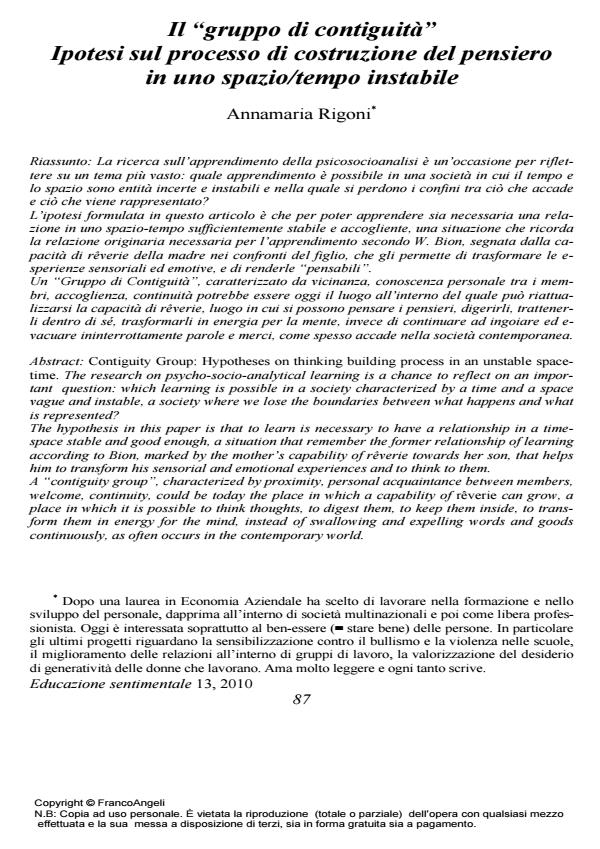Il "gruppo di contiguità". Ipotesi sul processo di costruzione del pensiero in uno spazio/tempo instabile
Titolo Rivista EDUCAZIONE SENTIMENTALE
Autori/Curatori Annamaria Rigoni
Anno di pubblicazione 2010 Fascicolo 2010/13
Lingua Italiano Numero pagine 12 P. 87-98 Dimensione file 439 KB
DOI 10.3280/EDS2010-013007
Il DOI è il codice a barre della proprietà intellettuale: per saperne di più
clicca qui
Qui sotto puoi vedere in anteprima la prima pagina di questo articolo.
Se questo articolo ti interessa, lo puoi acquistare (e scaricare in formato pdf) seguendo le facili indicazioni per acquistare il download credit. Acquista Download Credits per scaricare questo Articolo in formato PDF

FrancoAngeli è membro della Publishers International Linking Association, Inc (PILA), associazione indipendente e non profit per facilitare (attraverso i servizi tecnologici implementati da CrossRef.org) l’accesso degli studiosi ai contenuti digitali nelle pubblicazioni professionali e scientifiche.
La ricerca sull’apprendimento della psicosocioanalisi è un’occasione per riflettere su un tema più vasto: quale apprendimento è possibile in una società in cui il tempo e lo spazio sono entità incerte e instabili e nella quale si perdono i confini tra ciò che accade e ciò che viene rappresentato? L’ipotesi formulata in questo articolo è che per poter apprendere sia necessaria una relazione in uno spazio-tempo sufficientemente stabile e accogliente, una situazione che ricorda la relazione originaria necessaria per l’apprendimento secondo W. Bion, segnata dalla capacità di rêverie della madre nei confronti del figlio, che gli permette di trasformare le esperienze sensoriali ed emotive, e di renderle "pensabili". Un "Gruppo di Contiguità", caratterizzato da vicinanza, conoscenza personale tra i membri, accoglienza, continuità potrebbe essere oggi il luogo all’interno del quale può riattualizzarsi la capacità di rêverie, luogo in cui si possono pensare i pensieri, digerirli, trattenerli dentro di sé, trasformarli in energia per la mente, invece di continuare ad ingoiare ed evacuare ininterrottamente parole e merci, come spesso accade nella società contemporanea.
Parole chiave:Apprendimento, psicosocioanalisi, rêverie, funzione terapeutica del gruppo, ambiguità, Bion
- Partecipazione politica e costruzione del Sé Adelaide Baldo, in EDUCAZIONE SENTIMENTALE 21/2014 pp.26
DOI: 10.3280/EDS2014-021004
Annamaria Rigoni, Il "gruppo di contiguità". Ipotesi sul processo di costruzione del pensiero in uno spazio/tempo instabile in "EDUCAZIONE SENTIMENTALE" 13/2010, pp 87-98, DOI: 10.3280/EDS2010-013007